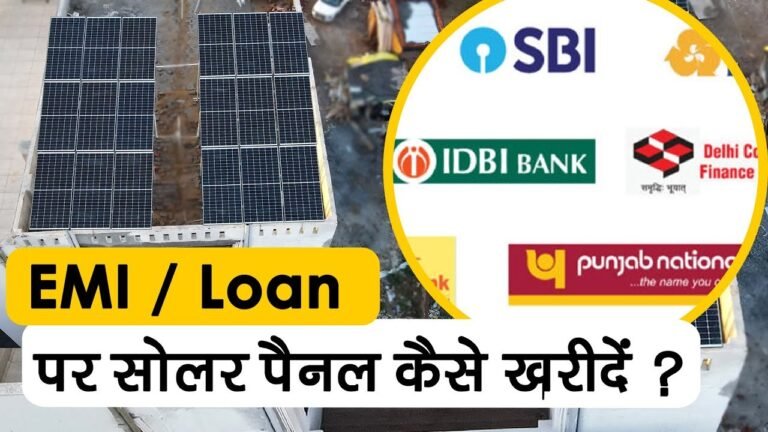The main reason why homeowners should invest in solar energy is that it lowers their electricity bills, increases the value of their home, and, ultimately, benefits the environment. Most people, however, find it difficult to make the decision to purchase solar panels for their homes. In this guide, we’ll walk you through all of the steps you need to take to buy the best solar panel for your home, as well as look at different financing options, including EMI, to help you save money on solar installation.
Determine Your Energy Requirements
The first step before purchasing any solar panel is to determine your solar energy requirements. Examine your utility bill statements to determine the average electricity consumption of your household. This information will help determine the necessary capacity of a solar panel system that should be installed in a home. Other factors to consider include the number of appliances in use, the number of people living in the home, and seasonal electricity demand trends.
In addition, consider the roof area potential and the amount of sunlight that hits your property. For the solar panel to function properly, it must be installed in a sunlit area with no obstructions; this is the requirement for your home’s roof according to the design.
- Choosing the Right Solar Panel System
Once the amount of energy required by the household has been determined, it is reasonable to select the most appropriate type of solar panel for home use. These factors include the panel’s efficiency, durability, and manufacturer warranty.
More advanced technologies used to manufacture solar panels, such as the TOPCon Bifacial solar panel, are more efficient at converting the sun’s rays into electrical energy, increasing energy efficiency. Finally, consider purchasing solar panels from well-established manufacturers who provide good warranties to protect your investment.
In India, several popular brands of solar panels are available in the market. Solar panel companies in India like Tata Power Solar, Luminous, Loom Solar manufacture the best grade panels suited to Indian weather.
- Understand Solar Panel Installation
The next step in the process of going solar is how to install solar panel. This can only be performed by specialized personnel to achieve maximum efficiency. The installation procedure typically involves the following stages:
- Type of Roof:Assess what type of roofing is in the undertaking site and to whether other roof mount structures need to be incorporated.
- Shadow-Free Area:Make sure that the area on where the installation will take place does not have any objects that can hinder direct exposure.
- Mounting Structure:Build an adequate and strong support so that the modules can be mounted on them.
- Panel Placement:Plan the most suitable arrangement including how many rows depending on the space available.
- Assemble the Structure:Reverse engineer the support frame structure then attach the solar panel support frame structure.
- Mount the Panels:Attach the panels on the robust structure.
- Buying Solar Panels on EMI
As people complete various transactions via the Internet, and more and more manufacturers and sellers accept indirect or third-party financing, it has become possible to purchase a solar panel system on EMI which broadens its consumer base. Well-known brands in the solar sector, for example, Tata Power Solar have collaborated with finance firms like Bajaj Finserv to provide for solar panel home financing on easy installments.
Customers can purchase solar systems on EMI in several ways:
- Credit Card EMI:Solar panels from energy providers are offered through EMI by banks such as ICICI, HDFC, and SBI. You can visit an online store such as Loom Solar and choose any product and opt for the EMI option of repaying the amount over a period of 3 or 6 months and no extra interest adds up.
- Bajaj Finserv EMI:For people who do not possess a credit card, there is something else that Bajaj Finserv allows for. You can buy solar panels using a Bajaj Finserv card and pay over minutes once the panels are installed.
- Home Loans:Similarly, home loans in India are available for solar panel installation. You can get a quotation from a well-renowned solar company and approach the closest bank for a loan to make up for the cost of your solar project.
Benefits of Buying Solar Panels on EMI
The major barrier that prevents most homeowners interested in using solar energy from doing so is the cost of installation. That is certainly not the case with irrelevant solar financing options available as they do not require charging of solar panels for home on EMI. There are no such payment obligations because a home equity loan has to be taken out to cover costs of installation.
By greatly lowering energy use, solar panels provide long-term savings. Homes may save between 40 and 70% on their energy costs on average, so the purchase of the panels will pay for itself in few years.
- Choosing the Right Solar Installer
Selecting a qualified solar panel installer can help to guarantee a seamless experience. Seek for installers with appropriate licensing, good customer evaluations, and considerable expertise. Ask for quotations to evaluate costs and solar subsidy. A reliable installer will guarantee a flawless installation process and offer direction on which panels fit your requirements.
Conclusion
Investing in solar panel for home is one way to reduce your electricity costs and contribute to a better future. Flexible financing choices like EMI have made solar panels more easily available to Indian house owners. Following these guidelines and hiring trustworthy Indian solar panel providers will help you to make wise solar energy investments and reap long-term advantages.

Daniel J. Morgan is the founder of Invidiata Magazine, a premier publication showcasing luxury living, arts, and culture. With a passion for excellence, Daniel has established the magazine as a beacon of sophistication and refinement, captivating discerning audiences worldwide.





